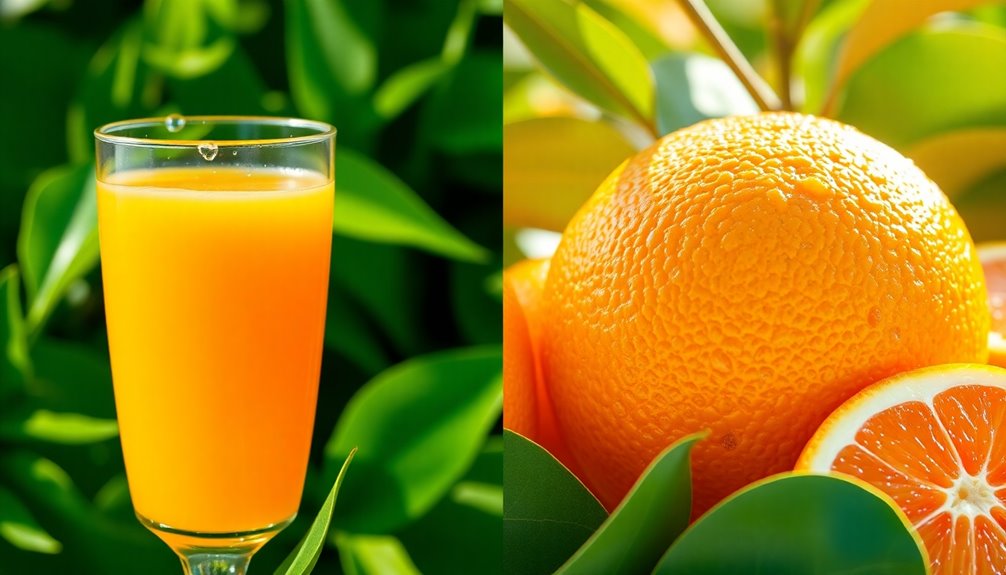When it comes to health, whole fruits are a better choice than fruit juice. Whole fruits pack essential vitamins, minerals, and dietary fiber, which juice lacks due to processing. This fiber helps regulate blood sugar and keeps you feeling full. Consuming juice regularly can lead to weight gain and increase health risks like diabetes or heart disease. So, stick with whole fruits for lasting benefits. There's more to explore about their incredible advantages!
Key Takeaways
- Whole fruits contain essential fiber and nutrients, while juice often lacks fiber and has concentrated sugars.
- Excessive juice consumption can lead to obesity and chronic diseases, unlike whole fruits which promote better health.
- Fiber in whole fruits helps regulate blood sugar levels and enhances digestion, benefits lost in fruit juices.
- Whole fruits contribute to satiety, potentially aiding weight management, while juice may lead to weight gain similar to sugary drinks.
- Regular whole fruit intake is linked to lower risks of heart disease, stroke, and type 2 diabetes compared to juice consumption.
Nutritional Differences: Juice vs. Whole Fruits
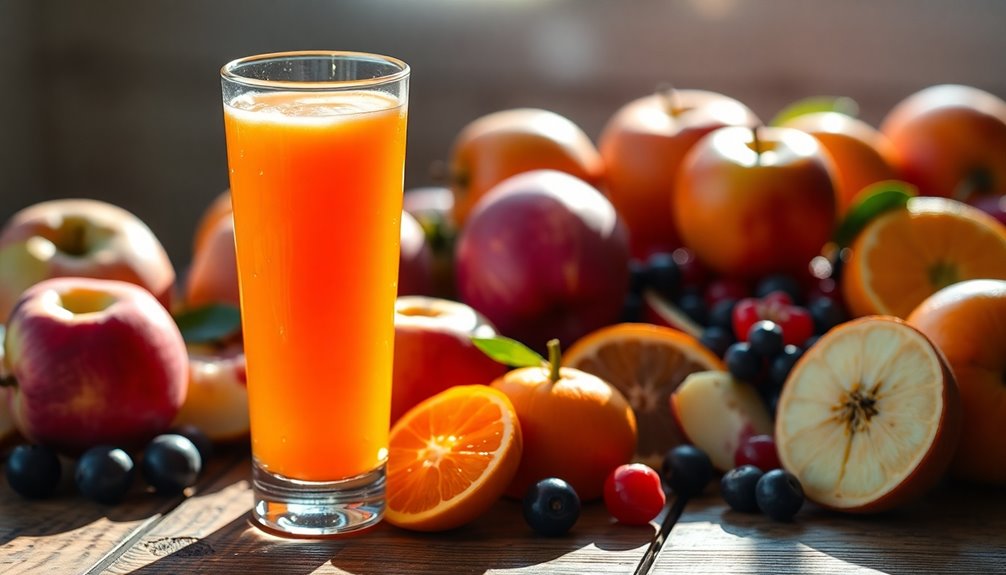
When comparing juice and whole fruits, you'll find significant nutritional differences that can impact your health.
Whole fruits are packed with vitamins and minerals that remain intact due to minimal processing. They also provide essential dietary fiber, which is mostly lost in fruit juice. This fiber not only aids in digestion but also helps regulate blood sugar levels and promotes satiety, making you feel fuller longer. Additionally, consuming whole fruits can help reduce appetite due to their high fiber content, as they typically contain more vitamins and minerals than juices.
While both options offer antioxidants, whole fruits contain additional nutrients from the skin and pulp. Moreover, fruit juice tends to be higher in calories because of concentrated sugars.
Health Risks Associated With Fruit Juice
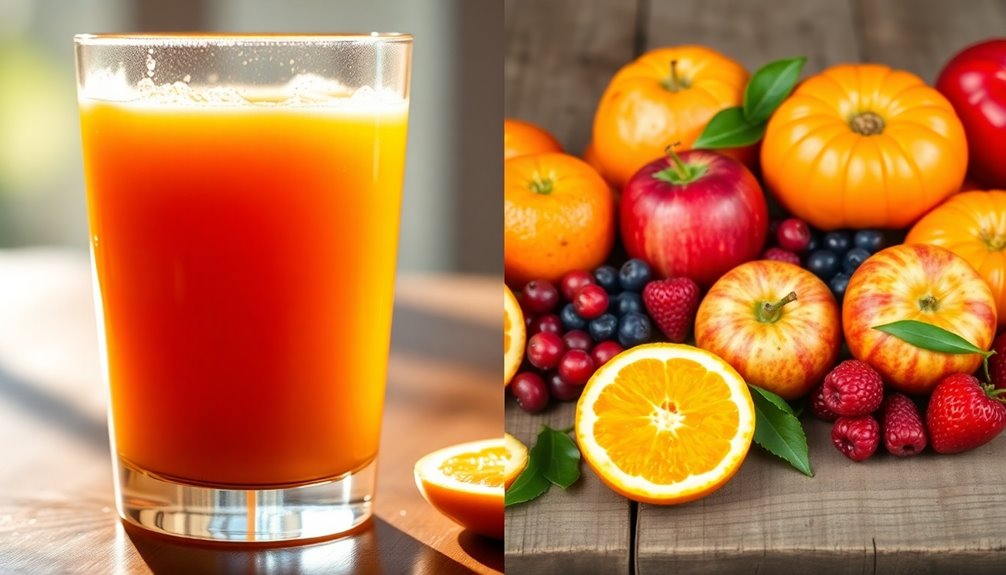
While fruit juice may seem like a healthy choice, it can pose several health risks, especially when consumed in excess.
Drinking too much juice can lead to obesity, heart disease, stroke, and type 2 diabetes due to its high sugar content. These sugars, classified as free sugars, can also increase your risk of dental cavities and insulin resistance. Regular consumption of high-sugar beverages can contribute to these conditions.
For children, regular juice consumption can displace healthier options like water and lead to poor dietary habits, resulting in increased obesity risk. Additionally, some fruit juices may contain harmful metals, posing neurodevelopmental risks. Moreover, whole fruit consumption is associated with better health benefits, highlighting the importance of choosing whole fruits over juices.
With all these factors, it's crucial to limit fruit juice intake to maintain better overall health and nutrition.
The Role of Fiber in Diet: Whole Fruits vs. Juices
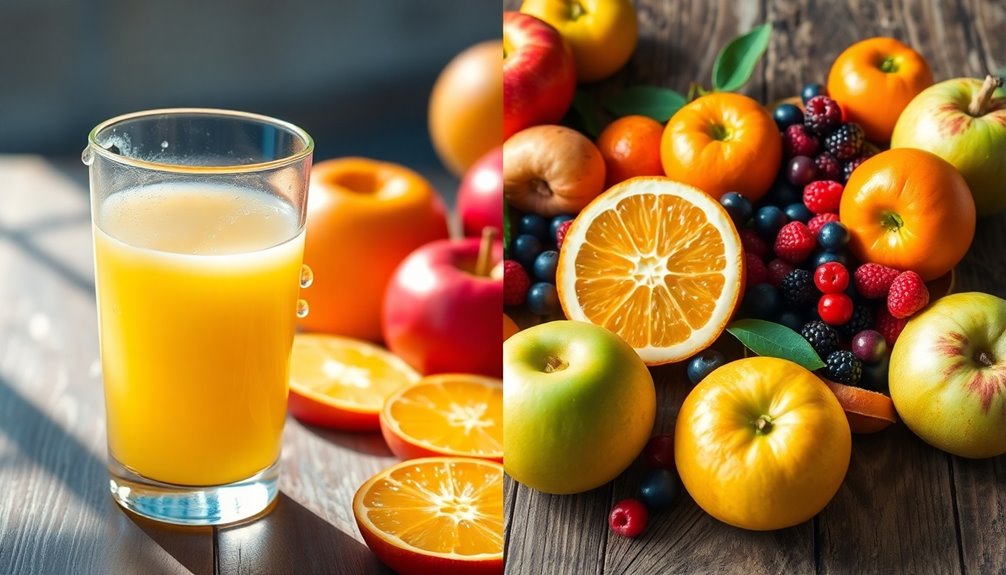
Fiber plays a vital role in your diet, especially when comparing whole fruits to juices. Whole fruits are packed with both soluble and insoluble fiber, which supports digestive health and helps you feel full. Whole fruits can help regulate blood sugar levels, making them a better choice for those concerned about their overall health. Additionally, the antioxidant effects of whole fruits can help combat oxidative stress in the body.
When fruits are juiced, most of this fiber is lost, leaving you with a much lower fiber content. This reduction can lead to quicker spikes in blood sugar levels, increasing the risk of conditions like heart disease and diabetes.
To meet the daily fiber recommendation of 21 to 38 grams, incorporating fiber-rich whole fruits like apples and berries into your meals is essential. Smoothies made from whole fruits can also be a delicious way to boost your fiber intake while retaining vital nutrients.
Impact on Weight Management and Satiety
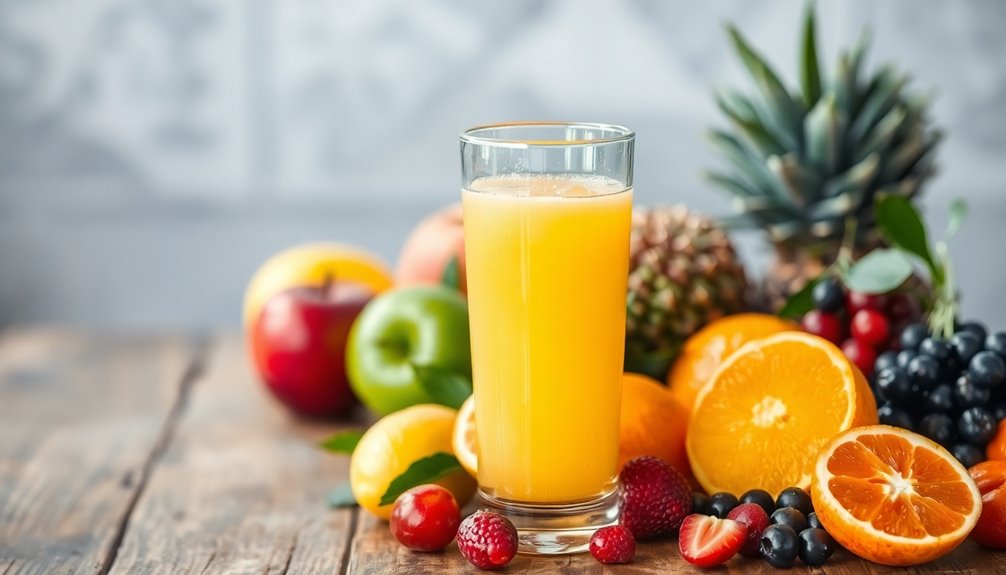
Understanding the impact of juice versus whole fruits on weight management and satiety is crucial for making healthier dietary choices.
Drinking 100% fruit juice can lead to weight gain, much like sugary beverages. Each six-ounce serving packs 60 to 120 calories, contributing to your overall caloric intake. Just one glass a day could add nearly half a pound over three years. In contrast, increasing whole fruit consumption by one serving daily may help you lose about a pound in the same period. Whole fruits offer more fiber, enhancing satiety and slowing digestion, which keeps you feeling fuller longer. Additionally, higher whole fruit intake is linked to decreased type 2 diabetes risk, further emphasizing the importance of choosing whole fruits over fruit juice. Incorporating foods high in dietary fiber can further support your weight management efforts and promote digestive health.
Long-term Health Benefits of Whole Fruits
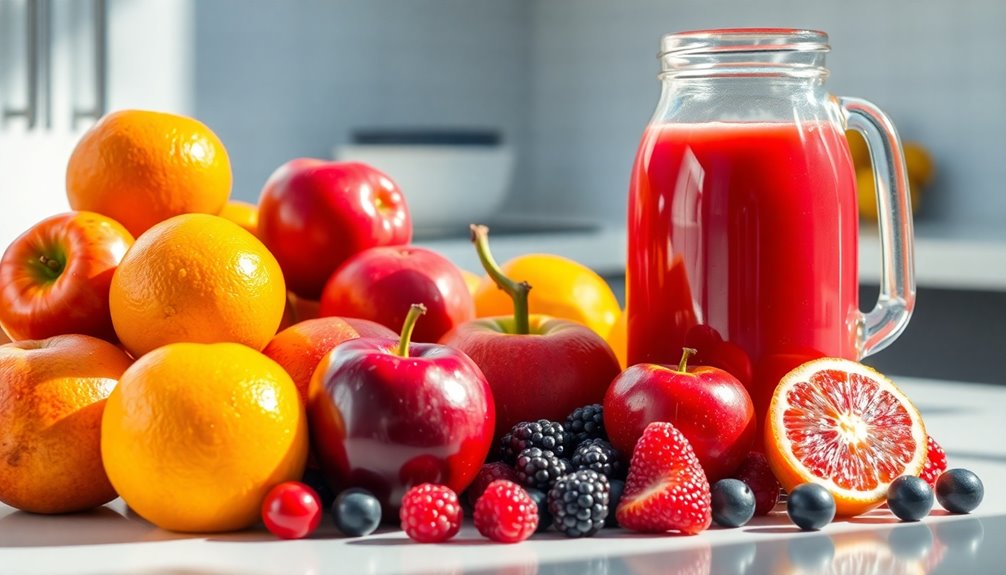
When you choose whole fruits over juice, you're not just making a tasty snack; you're also investing in your long-term health. Whole fruits protect your gastrointestinal health by reducing risks of constipation and irritable bowel syndrome, thanks to their fiber content. This fiber also supports a healthy gut microbiome, making regular bowel movements easier. Additionally, higher intake of whole fruits is linked to reduced risk of heart disease and stroke. Incorporating herbal teas into your diet may further enhance your overall health and well-being.
Moreover, eating whole fruits lowers your risk of chronic diseases like cardiovascular issues and type 2 diabetes. The phytonutrients in fruits can even help in cancer prevention.
Plus, whole fruits enhance your psychological well-being, improving mood and cognitive function. With these numerous benefits, it's clear that incorporating whole fruits into your diet supports not just your body, but also your mind and overall quality of life.
Frequently Asked Questions
Can I Blend Whole Fruits Instead of Juicing Them?
Yes, you can definitely blend whole fruits instead of juicing them.
Blending retains all the fiber, which is essential for digestion and helps keep you feeling full longer. You'll get a complete nutritional package, including vitamins and minerals, without wasting any part of the fruit.
Plus, you can customize your smoothies with other ingredients to enhance their nutritional value.
It's a delicious and efficient way to boost your overall health!
How Do Whole Fruits Affect Blood Pressure Levels?
When you indulge in whole fruits, you're not just treating yourself; you're also giving your blood pressure a helping hand.
Studies show that munching on at least four servings daily can lower your risk of hypertension. The fiber and antioxidants found in fruits like apples, berries, and grapes work wonders for your heart.
Are There Any Exceptions for Drinking Fruit Juice?
Yes, there are exceptions for drinking fruit juice.
If you've got dental issues or digestive problems, juice can be easier to consume. It can also provide a quick nutrient boost, like vitamin C, when whole fruits aren't available.
For athletes, fruit juice serves as a fast source of carbohydrates during intense workouts.
In certain medical conditions or emergencies, juice might be a more suitable option than whole fruits.
What Are the Best Whole Fruits for Weight Loss?
When you're aiming for weight loss, whole fruits are your best friends. You might think they're too sugary, but fruits like berries, apples, and grapefruit are low in calories and high in fiber, keeping you full and satisfied.
Incorporate avocados for healthy fats, or snack on kiwi for digestive support. Enjoying these fruits not only aids in weight management but also adds essential nutrients to your diet, making healthy eating a delicious adventure!
Can Consuming Whole Fruits Help With Skin Health?
Yes, consuming whole fruits can significantly benefit your skin health.
They're packed with vitamin C, which boosts collagen production and fights aging. The antioxidants in fruits combat oxidative damage, keeping your skin youthful.
Hydrating fruits like watermelon nourish and maintain skin suppleness. Plus, the fiber in whole fruits aids digestion, helping to clear up skin issues.
Conclusion
In the battle of the bites, whole fruits clearly win. They provide fiber that aids digestion, nutrients that boost immunity, and satiety that keeps you full longer. Juices, on the other hand, often lack these benefits and can lead to health risks like blood sugar spikes. So, for better health, choose whole fruits over juice. Enjoy the crunch, savor the taste, and embrace the well-rounded benefits of nature’s candy. Your body will thank you! In addition to their numerous health benefits, whole fruits also contribute to hydration and offer a variety of flavors that keep your taste buds engaged. When considering the whole fruits vs juices comparison, it’s clear that the former delivers a more balanced intake of essential vitamins and minerals without the added sugars often found in juices. By incorporating a diverse array of whole fruits into your diet, you not only enhance your nutritional intake but also develop a more enjoyable and sustainable eating habit.
Cindy thoroughly researches juicing trends, techniques, and recipes to provide readers with practical advice and inspiration. Her writing style is accessible, engaging, and designed to make complex concepts easy to understand. Cindy’s dedication to promoting the advantages of juicing shines through her work, empowering readers to make positive changes in their lives through the simple act of juicing.

